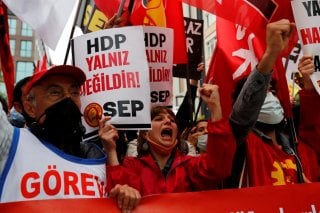The Turkish Nationalist Attack on the Kurdish HDP Is Just the Beginning
For every day that Turkey’s Kurdish question goes unresolved, Turkey will remain a country of unsolved murders, crushed opposition, and authoritarian abuse of power.
Recent allegations from exiled mafia boss Sedat Peker have put the Turkish government’s role in older unsolved murders back on the agenda. In all of these cases, no independent investigation to confirm or deny active state collusion has ever been allowed to take place.
There is also no way to know how many more attacks will follow. The ISIS bombings that hit the HDP and its allies six years ago occurred within less than twelve months of each other. Onur Gencer is far from the only Turkish citizen with ultra-nationalist prejudices to have spent time in Syria’s conflict zones. As Erdogan’s poll numbers continue to drop and anti-Kurdish and anti-HDP sentiment remain central to Turkish politics, there are, without a doubt, others willing and able to do what he did or worse—a serious challenge for democracy and stability in the country.
International Implications
For every day that Turkey’s Kurdish question goes unresolved, Turkey will remain a country of unsolved murders, crushed opposition, and authoritarian abuse of power. There will always be a ready-made justification for the next death, the next autocratic overreach, and the next war—a reality that threatens the people of the region and international interests alike.
This is not a problem the international community can ignore. For decades, the United States and its European allies have supported Turkey’s efforts to seek a military solution to its most fundamental political problem. Yet by doing so, they have created an internationalized conflict, and a government that now threatens their own interests. Erdogan’s regime is making authoritarian allies, protecting jihadists, and occupying the territory of foreign countries. Domestically, instability is only growing.
Violently closing the last civilian political space in which Kurds can operate and giving free rein to pro-government extremists will only accelerate this trend. International support for a political settlement that guarantees the Kurdish people their fundamental rights and freedoms could free Turkey from this dangerous path—and allow it to become a true democracy and a constructive player in the region. There is no need to wait for another crisis to realize that the country’s current trajectory is unsustainable for the region and the world.
Meghan Bodette is an independent researcher whose work has covered North and East Syria, Turkey, and Kurdish affairs. She holds a degree in International Politics from Georgetown University’s School of Foreign Service.
Image: Reuters.

